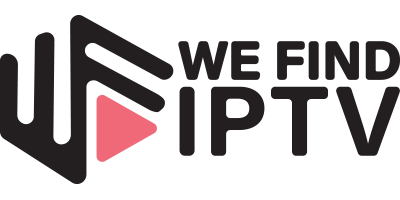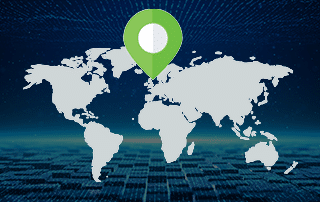
What Is A VPN? Best Uses For Virtual Private Network
What is a VPN or Virtual Private Network? What is the Best VPN?
These are frequently asked questions that we here at TROYPOINT receive on a regular basis.
The following guide will help you understand what a VPN is, how a VPN works, why you should be using one, and the best VPNs available.
We provide our top-rated VPN Services after thorough testing for various providers.
We Find IPTV’s Top Rated VPN Services
We have tested dozens of VPN Services throughout the years trying to find the best option for our readers and subscribers.
While all VPN Services essentially serve the same purpose, not all VPNs are created equal.
After thorough testing for various features including price, speed, servers, connections, Real-Debrid compatibility, and more, we have selected our top 5 recommended VPN Services.
Many of our site visitors use a VPN for Firestick which is why we used this device among others to determine the best options.
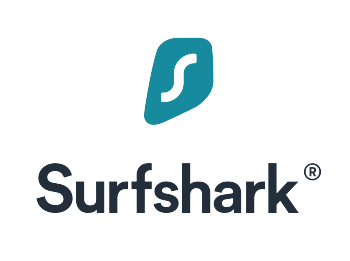
1. Surfshark
Surfshark VPN is now our top-rated provider in the We Find IPTV VPN Rankings.
There are tons of factors that we describe below which make this the best VPN option available today.
Price: $2.30/month for 2 years (Click Here for Discount)
*Price subject to change
Our special Surfshark discount will save you over 80% on a two-year plan.
They also offer a 30-day money-back guarantee if you are unsatisfied with the service for any reason.
Use the link below to get Surfshark VPN at a special discounted rate.
Speed
After testing Surfshark VPN on a Fire TV Stick 4K Max, we received the following speeds using WireGuard Protocol via Wi-Fi Connection.
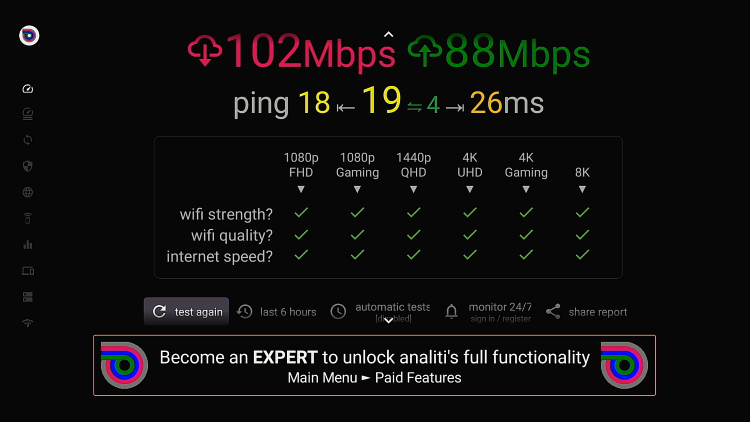
Servers:
Surfshark VPN provides over 3200 Servers in 65 Countries.

Some locations available include:
- United States
- United Kingdom
- Sweden
- Switzerland
- Russia
- Germany
- France
- India
- Brazil
- and more
Connections:
Just like IPVanish, Surfshark VPN provides UNLIMITED device connections simultaneously for complete anonymity and privacy.
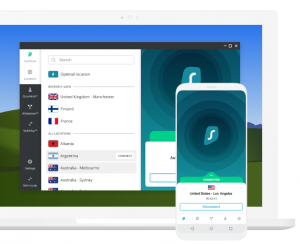
This is a key factor in determining your preferred VPN Service to ensure you are always protected.
Kill Switch:
One of the best features Surfshark provides is the Kill Switch option on Firestick & Fire TV. While many other VPN Services offer this technology, most aren’t available for these streaming devices.
However, the Surfshark App on Firestick has a Kill Switch feature that works fabulously.
No Log Policy:
Surfshark has a strict no-log policy which means they do not store or save any data while connected to one of their VPN Providers.

Surfshark is based in the Netherlands where local laws do not force VPN Services to store logs.
Real-Debrid:
Many people ask if Surfshark works with Real-Debrid and the answer is Yes!
While they are listed as a non-cooperative VPN on the real-debrid official site, over 3000 Surfshark IP Addresses are compatible with real-debrid for streaming high-quality media files.

2. IPVanish
IPVanish is We Find IPTV’s #2 recommended VPN provider for several reasons mentioned below.
It has an easy-to-install application available for any device you prefer including Firestick, Fire TV, iOS, Android, and more.
Price: $3.99/month for 1 year (Click Here for Discount)
*price subject to change
Our special IPVanish discount will save you over 60% when you purchase a yearly subscription.
They also offer a 30-day money-back guarantee if you are unsatisfied with the service for any reason.
Speed:
After testing IPVanish on a Fire TV Stick 4K Max we received the following speeds using OpenVPN Protocol via Wi-Fi Connection.
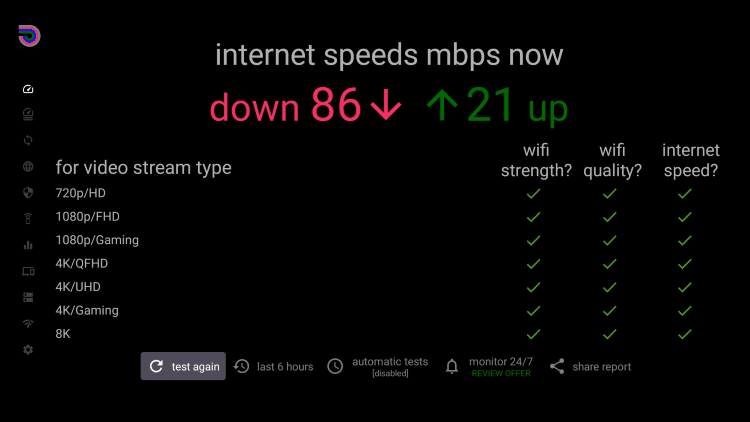
With an ethernet connection using the same VPN Server and Protocol, our speeds were a bit faster.
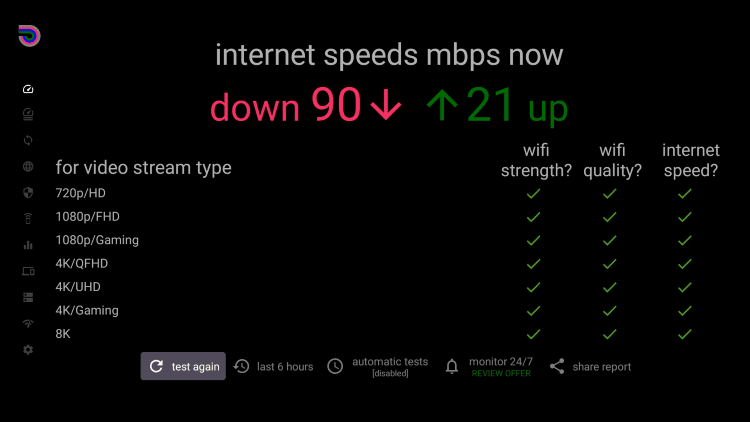
Servers:
IPVanish owns and operates over 2,000 servers in more than 75 VPN locations.
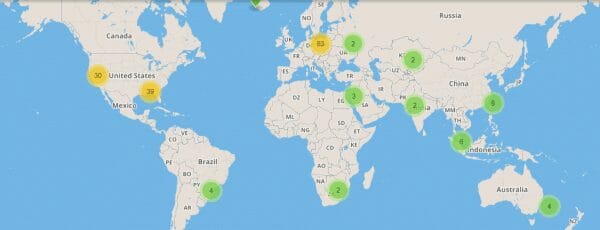
This includes:
- United States
- United Kingdom
- Japan
- Mexico
- Canada
- Australia
- and more
Connections:
IPVanish supports UNLIMITED VPN connections simultaneously with one account. This means all of your internet-connected devices are protected without having to purchase a separate subscription.
Kill Switch:
IPVanish VPN has kill switch capabilities that will cut your internet connection if your VPN connection ever stops working. This is perfect for those downloading torrents.
No Log Policy:
IPVanish provides a strict no-log retention policy which means your data is not saved or stored for any reason.

Real-Debrid is used by thousands and thousands of cord-cutters to provide high-quality streaming links.
IPVanish is on Real-Debrid’s Cooperative VPN Providers list so you can use this service with your IPVanish VPN.
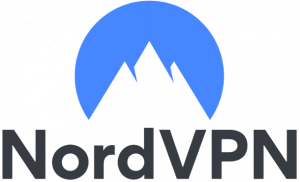
3. NordVPN
NordVPN is likely the most popular VPN Service available today.
Many choose NordVPN because it claims to be the fastest VPN Provider on the market.
This is due to its large number of servers that are available for connection across the entire globe.
Price: $3.29/month for 2 years (Click Here for Discount)
*Price subject to change
Our special NordVPN discount will save you over 60% when purchasing the 2-year plan.
Best of all, there is a 30-day money-back guarantee if you don’t like the service for any reason.
Speed:
We tested NordVPN’s speeds using a Fire TV Stick 4K Max with OpenVPN Protocol via Wi-Fi and received the following results:
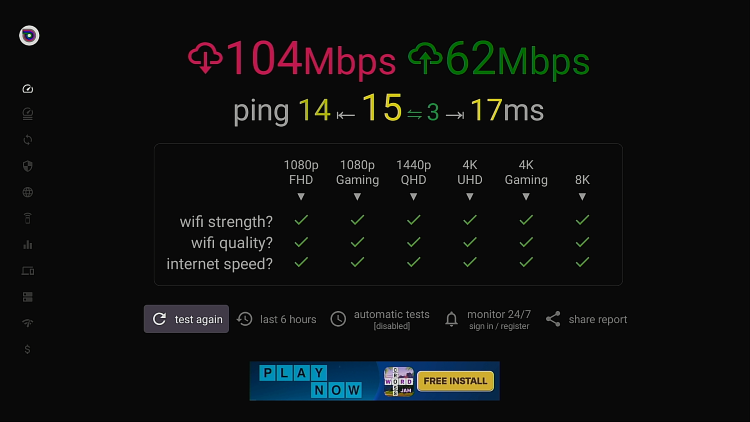
Servers:
NordVPN features over 5,400 servers in 6o countries around the world.
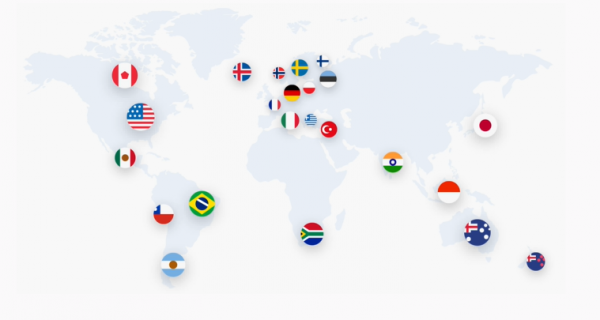
Best of all, NordVPN uses obfuscated servers which means websites are unable to tell that you are connected to a VPN.
Sometimes, users encounter websites that block all VPN traffic but we can bypass this when connected to a NordVPN server.
Some locations available include:
- United States
- United Kingdom
- New Zealand
- Brazil
- Mexico
- Germany
- Costa Rica
- Sweden
- Switzerland
- and more
Connections:
Unlike IPVanish and Surfshark which provide unlimited connections, NordVPN currently offers 6 simultaneous VPN connections.
Because most households have 10 or more internet-connected devices at any given time, we would like to see this number grow in the future.
Kill Switch:
NordVPN has a Kill switch feature that works on various devices including PC.
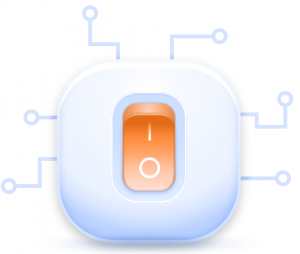
Unfortunately, this option is not available on Firestick or Android TV devices.
No Log Policy:
NordVPN, like many other VPN Providers, offers a strict no-log policy which means your data is not stored when connected to a server.

Since NordVPN is incorporated in Panama, there are no data retention laws to adhere to.
Real-Debrid:
NordVPN is listed as a Cooperative VPN Provider by Real-Debrid which means you can easily use this service in conjunction with Nord when streaming media files.

4. ExpressVPN
ExpressVPN is a popular VPN provider that is best known among streamers and cord-cutters.
It provides extremely fast speeds and works on nearly any device you prefer including Firestick, Android, Windows, iOS, and more.
Price: $6.67/month for 12 months (Click Here for 3 Months Free)
*Price subject to change
ExpressVPN is offering 3 months absolutely FREE when you sign up for a 12-month subscription for their service. This is 49% off the regular price.
Express also offers a 30-day money-back guarantee if you are unsatisfied with the service for any reason.
Speed:
We tested speeds for ExpressVPN on a Fire TV Stick 4K Max using a wi-fi connection and received the following results:
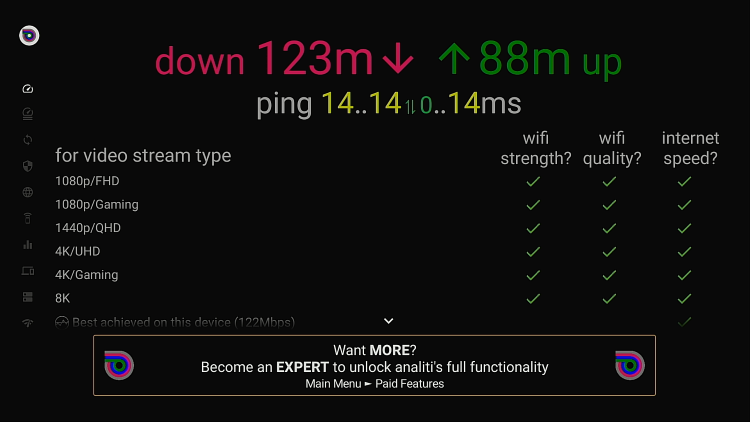
Servers:
Express offers 160 VPN Server Locations in 94 countries.

Some locations available include:
- United States
- Brazil
- United Kingdom
- Colombia
- Costa Rica
- Argentina
- Canada
- Chile
- Peru
- and more
Connections:
ExpressVPN provides users with 5 simultaneous connections.

Similar to NordVPN, we would prefer this number to be higher as most households have upwards of 10 internet-connected devices at once.
If you need more than 5 simultaneous connections, you may want to opt for a different VPN Provider.
Kill Switch:
Network Lock is a feature provided by Express that works as a VPN Kill Switch.
When using Network Lock within ExpressVPN, your internet connection will end if you are ever disconnected from the server.
This is available on Windows, Mac, and Linux. Firestick devices have a “Network Protection” feature that works in the same manner.
No Log Policy:
Express does not log IP Addresses, browsing history, traffic destination, or DNS queries.

However, they do collect data such as apps successfully activated, dates when connected to VPN, choice of VPN Server, and the total amount of MB transferred per day.
Real-Debrid:
Like most well-trusted VPN Services, Express is listed as a Cooperative VPN Provider by real-debrid.
This means you can easily use this service in conjunction with any ExpressVPN server.

5. StrongVPN
StrongVPN is most well-known for its implementation of the WireGuard® protocol.
They were the first commercial VPN Provider to offer WireGuard which features tons of advantages when connected to a VPN Server.
Price: $2.47/month for 1 year (Click Here for Discount)
*Price subject to change
This promotion will save you over $100 when you purchase a year’s subscription.
There is also a 30-day money-back guarantee if you are not satisfied with StrongVPN for any reason.
Speed:
Below are the speeds we received on a Fire TV Stick 4K Max when using WireGuard® Protocol via wi-fi connection.
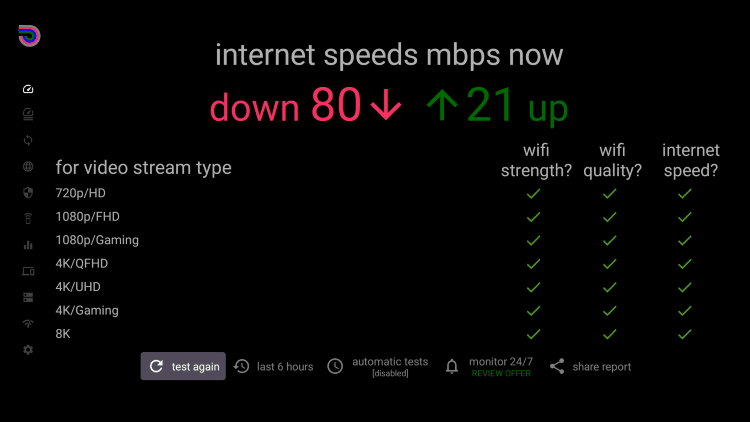
Servers:
StrongVPN provides 950 VPN Server connection options in over 30 countries.
This includes areas such as:
- United States
- United Kingdom
- Canada
- Germany
- China
- Japan
- Australia
- Mexico
- and more
Connections:
StrongVPN provides up to 12 simultaneous connections for your internet-connected devices.

Many other VPN Services offer unlimited connections which is more suitable for today’s technologically advanced world.
Kill Switch:
Kill Switch capabilities are available with StrongVPN.
This does not include Firestick or Android TV devices. However, PCs do have this feature which is handy when torrenting and more.
No Log Policy:
Like many popular VPN Providers, Strong has a strict zero-log retention policy for all subscribers.
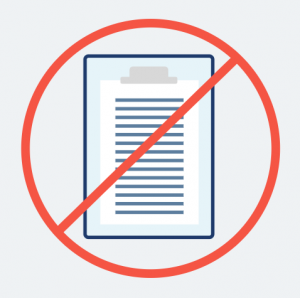
Strong owns and operates its servers so your data is always protected and private.
Real-Debrid:
StrongVPN is listed as a Cooperative VPN Provider by real-debrid.
This is perfect for those who use this service in conjunction with Streaming Apps & APKs.
TROYPOINT VPN Tutorials
In addition to guides for our top recommended VPN services, TROYPOINT has created several other VPN tutorials for popular devices.
This includes the Amazon Firestick/Fire TV, NVIDIA Shield, Chromecast, Android TV Boxes, routers, Windows PC, Mac, iOS, LibreELEC, and more.
VPN on Firestick/Fire TV
Installing a VPN on any Amazon Firestick or Fire TV device is essential when it comes to protecting yourself while streaming.
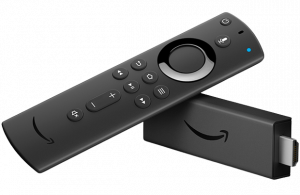
Running a VPN on a Firestick or any Fire TV device will protect you online from hackers, developers, website operators, ISPs, and other bad actors.
How to Install VPN on Firestick/Fire TV
VPN on Android TV Boxes
Similar to the Amazon Firestick, using a VPN on Android TV Boxes is also important for protecting your online identity.
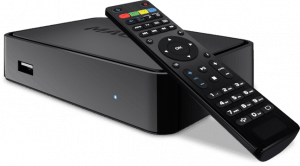
Our VPN tutorial for Android TV Boxes works on popular devices such as MECOOL, X96 Max, BuzzTV, Mi Box, and even Android phones and tablets.
VPN on NVIDIA Shield
The NVIDIA Shield is one of the most popular streaming devices on the market, and for good reason. Due to its streaming capabilities, it’s important to protect yourself when using this device.
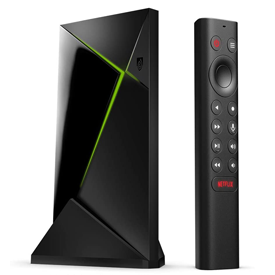
Our VPN tutorial for the NVIDIA Shield works on all models. Click the link below for step-by-step instructions.
VPN on Chromecast with Google TV
The Chromecast with Google TV has become an increasingly popular streaming device among cord-cutters. Like other devices, it’s critical you protect yourself when streaming from the Chromecast.
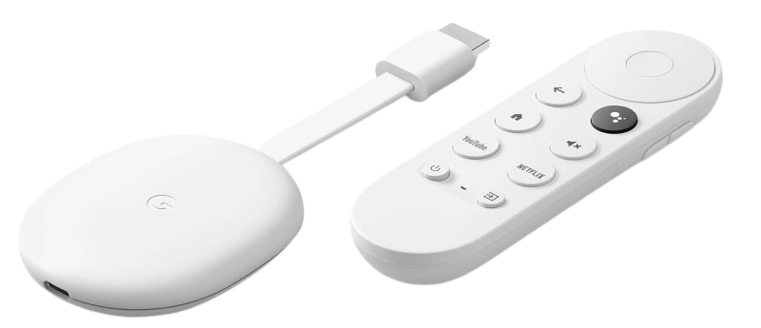
See our complete tutorial below for installing a VPN on the Chromecast with Google TV.
VPN on Windows PC
Running a VPN on a Windows PC is a must for those using this device to stream movies, download torrents, access geo-blocked websites, and more.

Our VPN on Windows PC tutorial covers everything you need to know about installing a VPN on this device.
How to Install VPN on Windows PC
VPN on Routers
Installing a VPN on a router will protect all of your internet-connected devices inside your household. This will make all of the devices on your network 100% anonymous.
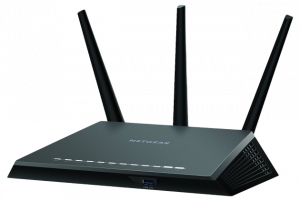
When you set up a VPN on a router, you will no longer need to install your provider’s application on each individual device, which is very handy.
Important Note: Installing a VPN on a router is how you protect devices where it isn’t possible to install a VPN application such as Roku, Xbox One, Apple TV, or PlayStation.
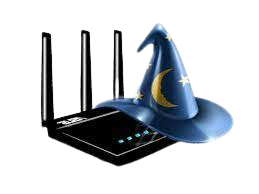
We Find IPTV TIP: For those using routers with Asus-Merlin firmware, it’s important to note that the process for installing a VPN is different. See the link below if you fall into this category.
VPN on Mac
Similar to Windows PC, running a VPN on any Mac computer is a must if using this device for streaming, torrenting, or accessing geo-restricted websites.
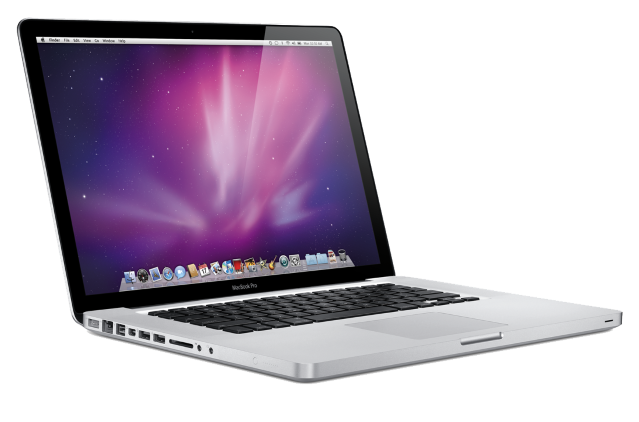
Visit our complete tutorial below for installing a VPN on any Mac computer.
VPN on iOS (iPhone & iPad)
Due to increasing privacy concerns, using a VPN on iOS devices like iPhones and iPads is becoming more important to protect yourself.
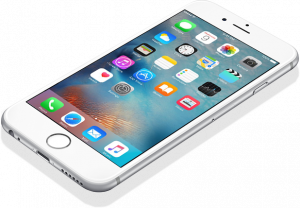
We have put together a detailed tutorial below for installing a VPN on any iOS device.
VPN on LibreELEC
While LibreELEC is not a streaming device, this popular software is a fork of Kodi based on the Linux operating system. Many use LibreELEC with a Raspberry Pi device.

Since LibreELEC is based on the Linux Operating System, you can easily install a VPN to protect yourself while streaming.
See our full VPN on LibreELEC tutorial below for more information.
VPN on Chromebook
Many people have turned to Google Chromebooks over the past several years due to their simplicity and affordable price tag.
And like any computer, using a VPN on a Chromebook is important for protecting your online activity.
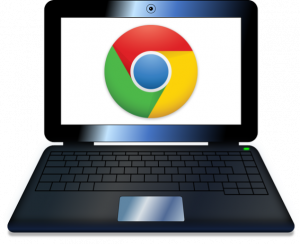
See the link below for installing a VPN on any Chromebook.
What is a VPN?
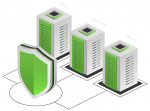
A VPN allows you to access the Internet privately and securely.
In technical terms, a VPN will encrypt your connection so that anything transmitted from your Firestick, Fire TV, Android Box, computer, etc. is unreadable.
Your traffic is then routed through a VPN server and your external IP address is changed so that you become 100% anonymous.
Most people don’t understand that their Internet Service Provider (ISP) assigns an external IP address to their account.
You can think of an IP address as a unique phone number for your Internet connection.
All of your Internet activity ties directly back to YOU through your IP address.
2.96.20.177
Your real IP Address (above) will be masked with a different anonymous number once you activate a VPN.
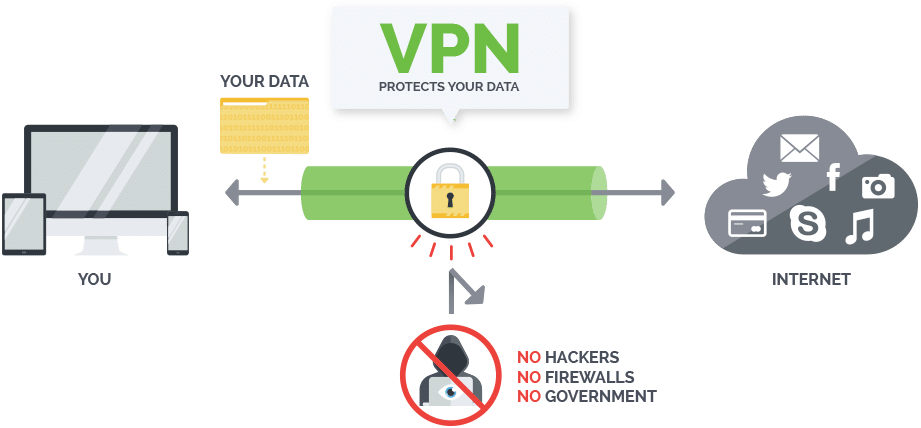
By using a VPN, your Internet Service Provider, App/add-on developers, government, hackers, and others will no longer be able to monitor and log what you are streaming or downloading.
VPNs not only protect us when streaming or downloading through free apps or add-ons.
For years, companies have taken advantage of VPNs as a way for their employees to work remotely without exposing their information to the open internet.
If you use public Wi-Fi networks, travel, or tend to work away from the office, the use of a VPN is crucial.
Most high-level companies use VPNs to protect their data and information and you should as well.
A Virtual Private Network has become more popular today, but not solely for its original purpose of preventing others from unauthorized access.
VPNs give access to all content on the web while hiding your activity from your Internet Service Provider (ISP), app/addon developers, government, and potential hackers.
Plus, using a VPN will enable you to alter your “geo-location” and access apps, websites, and other content that is not available in your country or region.
How Does a VPN Work?
Before discussing how a VPN works, it is necessary to realize why not having a VPN can ruin your privacy.
If you’re stuck at the airport waiting for your flight, at a local coffee shop, or a library, chances are that you’ll be connecting using the public Wi-Fi to save on your data plan.

When accessing hot-spots, you allow all your data to pass through an unencrypted network (data that is not converted to a form of “secret code” to prevent unauthorized access).
Everything that you’re doing from entering passwords to interacting on social media becomes vulnerable to prying by hackers who can get in between these data transmissions.
This is a threat called a man-in-the-middle (MitM) attack, which is very common these days.
The attacker alters your communication with the website or app in order to either pry on your activity or impersonate you to obtain private information.
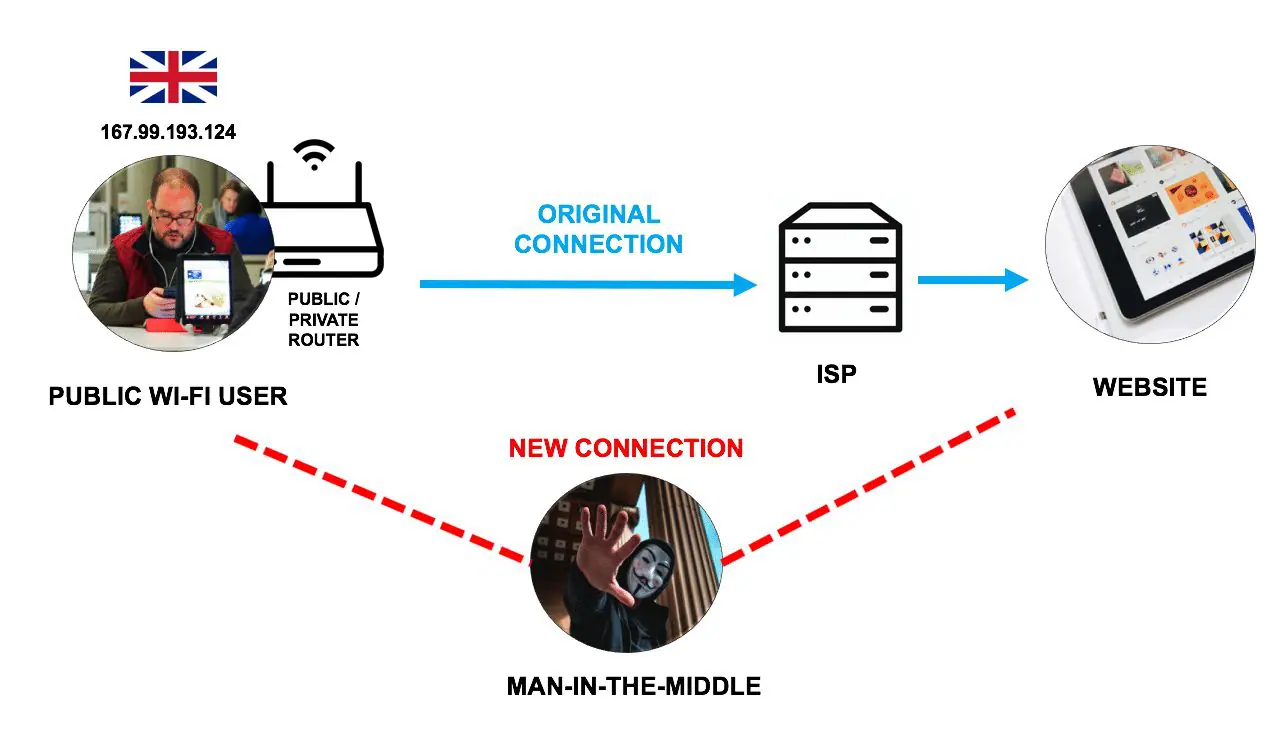
You are also exposed to malware distribution, Wi-Fi snooping and sniffling, and connections to rogue hotspots by cybercriminals.
That’s why experts warn of the risks involved in connecting to unsecured networks and logging credentials to websites, sending personal communications and images, typing in passwords, and sharing other confidential information.
By not using a VPN, you are compromising your Wi-Fi network, becoming vulnerable to DDoS and web application attacks.
But with a VPN, you’re completely reducing these risks.
First, your internet connection is encrypted on your device. All searches and activity on your computer, tablet, mobile device, etc., are done through the VPN where it is encrypted and hidden from any onlookers.
Next, your IP address changes once connected to the VPN server. The VPN will mask your IP address to websites you visit which makes it impossible to know the “geo-location” of your computer or device.
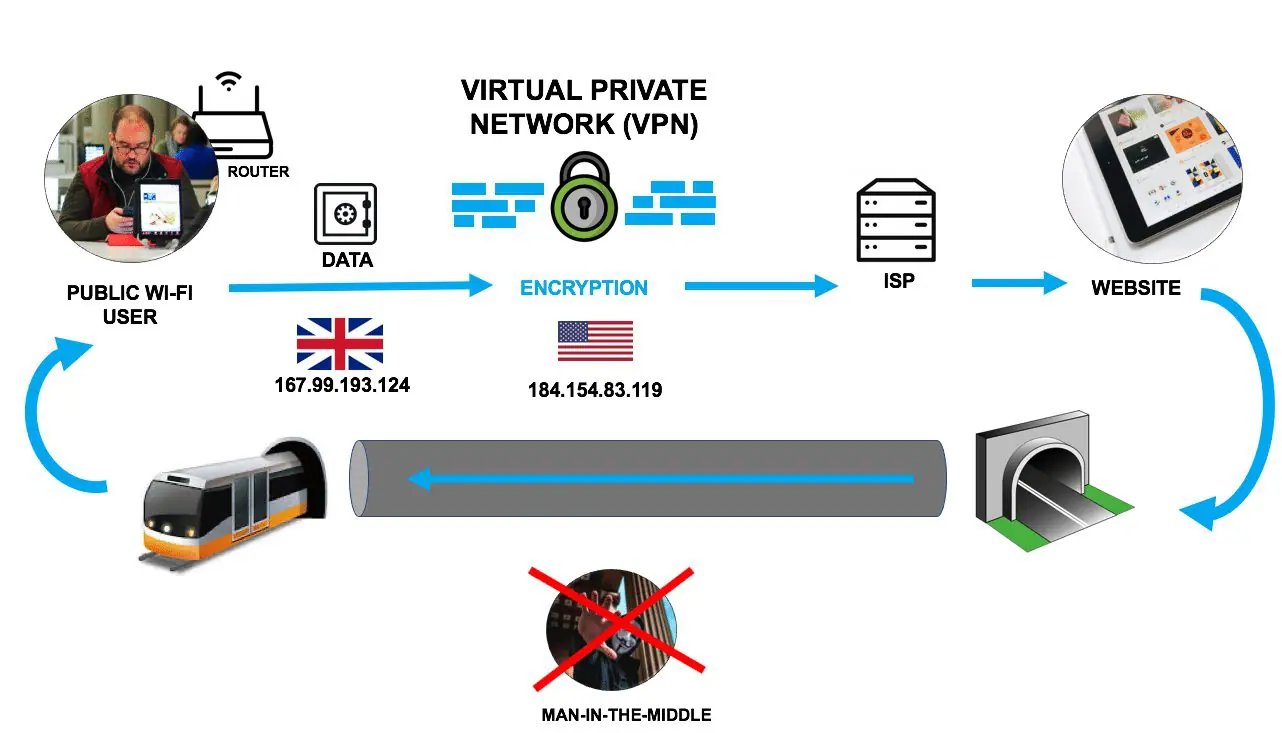
Finally, once you’ve accessed the Internet anonymously and securely, VPNs will tunnel your information through a separate network, securing your data and hiding it completely.
This provides encrypted online traffic, prevents bandwidth throttling, allows online anonymity, and unblocks geo-restrictions.
For more information on geo-restrictions, refer to our article below.
Why Should I Use A VPN?
Using a VPN is the best way to ensure your privacy online no matter the device you are using.
Listed below are 10 various reasons why using a VPN can be of use to just about anyone.
1. Hide Your IP Address
One great aspect that a VPN provides is to hide your computer’s IP address.
This means that the site of your computer or device can be manipulated so that your location is incorrect or unknown.
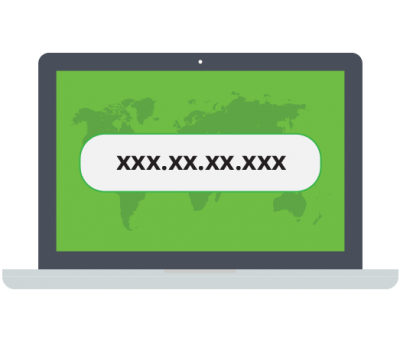
It can move your IP address to a designated location of your choice, which allows for complete freedom from any restrictions that your current location may provide.
Many find this valuable when they are trying to access content that is restricted to where they are located.
So if you’re on a business trip in the United Arab Emirates but it has restricted access to certain websites, you can connect to a VPN server in Canada to pretend that you’re surfing in Toronto, for example, even though you’re in Abu Dhabi.
2. Online Anonymity
While using an incognito browser to surf the web seems completely safe, this is actually not the case.
The last thing that you’d want to share is any information related to your passwords, bank savings, credit card numbers, and any personal data with your IP address is easily traced.
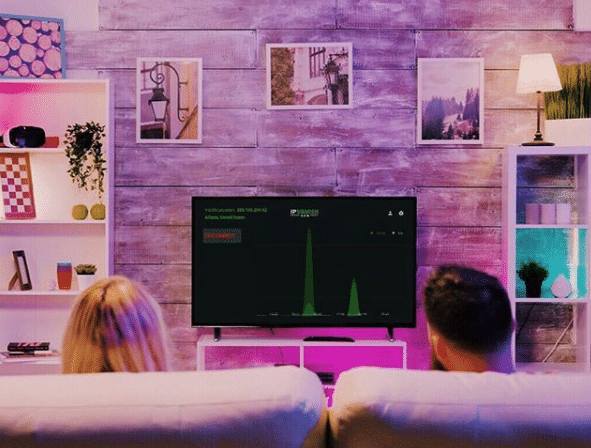
A VPN will make your original IP address vanish in the prying eyes of the public.
And remember, even if your connection gets intercepted, it will be very hard to trace your activities and data since you are protected by the VPN server you are connected to.
3. Use Streaming Services
For those interested in using Kodi, APKs, IPTV, Torrents, or other free media streaming services, many of these are now blocked in various countries.
With a VPN in place, you will be able to use such apps and services freely by changing your computer’s IP address.
Some paid streaming services are now starting to block those who are using VPNs. A solution that works with many providers is connecting from a different server until you establish a successful connection.
4. Prevent Throttling
Most ISPs control your bandwidth speed. This means any streaming devices you may be using could take longer to load which means more buffering and less enjoyment.
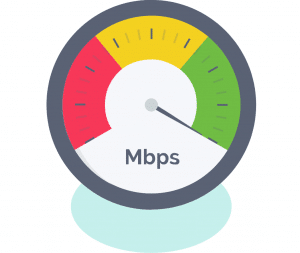
With a VPN in place, your activity is hidden from the ISP so your bandwidth will not be throttled down while streaming.
5. Block Ads
VPNs provide a few extra benefits as well to go along with the added security. Some VPN services can block unwanted ads, trackers, and even targeted ads.
With the proper network, you will be able to browse freely without being sold on previous search items.
6. Prevent ISPs from Keeping Logs
Many service providers will not keep logs or data on your user and browser history.
Without this type of information, it is nearly impossible for somebody to recover exactly what you have been doing on the internet.
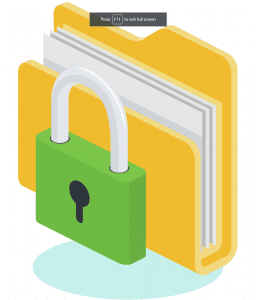
When searching for a provider, be sure to research which ones do keep logs and which ones do not.
7. Access Torrents
Torrenting is one of the most used purposes of a VPN. With a VPN running on your torrent device, your traffic will appear to be coming from a different location, keeping you anonymous.
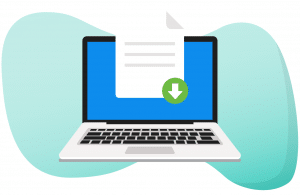
However, not all VPN services allow torrenting so you should find one that is specifically designed for such activity.
8. Use Public Wi-Fi Securely
Do you have a habit of using Wi-Fi at the airport or in cafes? Think about the other users connected to the same network that are ready to lurk into your system.
The last thing you’d want to do is to compromise all your private information on social media or online banking for instance.
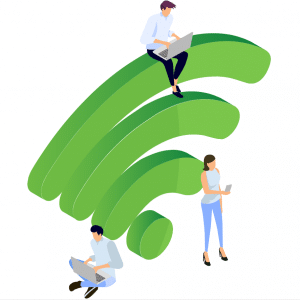
A concealed IP address through a VPN server is what you need so that you can still use public Wi-Fi securely.
9. Secure VoIP Calls
Voice-over-IP or VoIP calls have become popular due to their low costs, accessibility flexible network layout and improved audio quality over the years.
The most common type is a software-based VOIP service such as Skype, WhatsApp, Google Hangouts and Zoom.
You can secure your voice calls with a VPN, which guarantees you the utmost privacy.
10. Prevent Google Tracking
Google’s free services log your searches, movement, and online activities. If you want to prevent it from tracking you, hide your IP address by using a VPN.
Other Uses Of A VPN
Along with using a VPN for your personal computer, you can also install one on your many other applications.
Doing this will block all unknown parties from accessing what you are streaming or downloading.
Listed below are step-by-step guides on how to set up a VPN with the most popular electronic devices available.
IMPORTANT: Many people think that you must install something onto your router to use a VPN, this is not true. It is possible to install a VPN on your router and you will find the tutorial below for that.
When you install a VPN onto your router, all network traffic is protected by the VPN.
By doing this, you don’t need to run a VPN application on each device.
Are VPNs Legal?
There are a few countries that have deemed VPNs to be illegal. Most We Find IPTV visitors originate from the United States, Canada, and the United Kingdom.
As of this writing, a VPN is legal in each of these three countries.
Some notable countries where a VPN is considered illegal include China, Russia, Belarus, Oman, United Arab Emirates, Turkey, and Iraq.
Latest Legal News in the Streaming World
The articles listed below cover some of the latest legal issues in the world of streaming.
These serve as yet another reminder to always connect to your VPN while streaming or accessing 3rd party applications.
Should I Use Free Or Paid VPN?
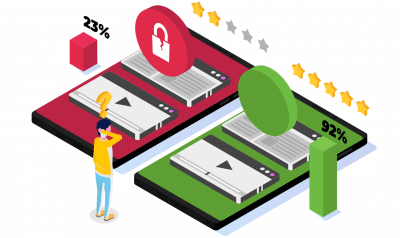
There are many different VPN service providers available today. When selecting which service is best for you, there will be two options. Free versions and paid versions.
Most paid versions require a monthly fee for their service. While both do work well, there are several drawbacks to using a free VPN provider.
When examining the free VPN services available, always remember that these providers are making money somewhere.
Whether it is through selling your data or installing malware on your device, these free VPNs are profiting from your use of their service.
Oftentimes, these services only allow for one connection and may require registration.
This is the case for ProtonVPN which is one of the most popular Free Services.
The free option obviously has the distinct advantage of not having an initial or monthly cost associated with the service.
But when you are in the market for a Virtual Private Network, make sure you know exactly what you are getting.
Most free versions will have slower speeds and connections than a paid service would. Another problem people run into with a free VPN service is the ads and pop-ups that may be associated with it.
The reason this occurs is that when you use a free service provider, they might sell your data to ad companies to pay for their overhead costs.
In summary, almost all free VPN services:
- Have limited VPN Protocols
- Don’t offer stable connections
- Can only offer slow speeds
- Disconnects your network regularly
- Provides no customer support
- Have very few servers available
- Lacks compatibility with some electronic devices
While this may seem like a reasonable route to take, you will definitely be getting what you pay for.
With a paid service, connection speed, customer service, and your privacy will all be of better value. I’ve thoroughly discussed the downside of using a free VPN service in the article below:
What Should I Look For In a VPN?
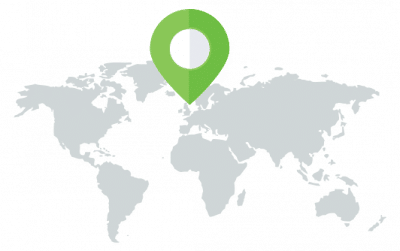
Given all these valuable reasons why you need a VPN, the next question is how to choose a reliable VPN service provider. Below are some of the criteria on what you should look for in a VPN.
- Reliable connection
- Compatible apps for various operating systems
- Offers faster speed
- Thousands of servers in global locations
- No traffic logs
- Unlimited peer-to-peer traffic
- Unlimited server switching
- Many simultaneous connections
- 24/7 customer support
- Money-back guarantee
- Transparent privacy policy
- Has a lot of recommendations from independent reviewers
The most important features to consider with any VPN are download speed and ease of use.
When a VPN connection is established, the download speed will be decreased for two reasons.
First, the processing power required to run a VPN application in the background of your device will decrease download speeds.
Second, when a VPN connection is made, traffic is being sent through a secure server which also decreases speed.
Another important feature is how friendly the user interface is on the device that you are using.
It is important to find a service that provides applications for a range of different devices such as Windows, iOS, Linux, Android, Apple, Fire TV/Stick, etc.
You want to be able to use the VPN on every device you own that connects to the Internet.
The recommended VPN outlined below serves up blazing-fast download speeds along with a friendly user interface on all of its applications. You can also use the service on up to ten different devices simultaneously.
Other Questions About VPNs
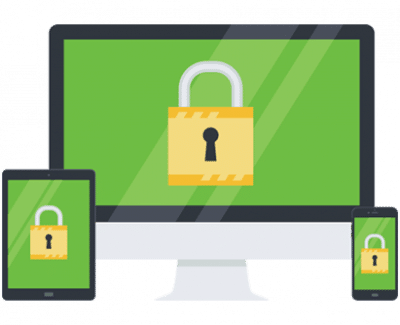
1. Does a VPN Cause a Decrease in Internet Connection?
Connecting to a VPN naturally decreases the speed of the internet connection because of the encryption process of your internet data that is implemented by a VPN.
Also, the VPN application is routing your Internet traffic through a VPN server.
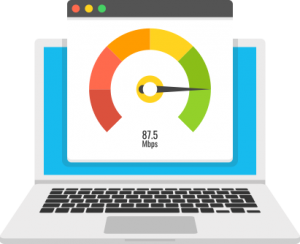
2. How Many Devices can a VPN Support?
This depends on your VPN service provider. While you may think you’ve saved money using a free VPN service, this would only provide you a very limited number of connections.
3. How Safe is Using a VPN?
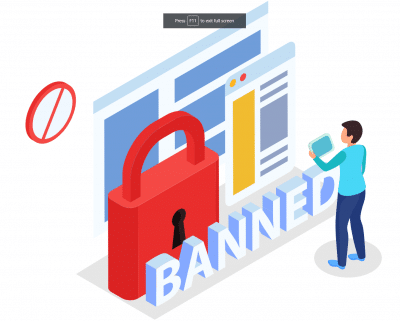
This depends on the kind of VPN service that you have subscribed to. It should offer anonymous torrenting, at least 256-bit AES encryption and won’t record traffic logs.
In addition, it should have future-proofed privacy and IP-masking on many server locations worldwide.
4. How Many Connection Types Should a VPN use?
Multiple connection types must be offered by your VPN service provider to provide better security association, various types of authentication and faster access speeds.
5. Why should a VPN Service Provider Need to Have Many Servers?
If a VPN service provider has only a few servers available, this would result in overcrowding and could drastically reduce speeds.
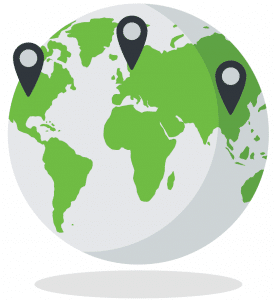
If you happen to live in a location far away from the few servers being offered, it could also result in the same issue.
A global presence of servers should be available for more options. This is especially useful in areas like Ukraine, Russia, other parts of the world.
6. Is YouTube Blocked or Restricted because of a User’s Location?

Depending on your location, YouTube can be blocked (such as in China) or have some videos disallowed for streaming when it displays the message, “This video is not available in your country.”.
You can unblock YouTube with a VPN and alter your geo-location. This is the best way to avert any restrictions you encounter including other blocked sites.
7. Why Do you Need a VPN when Torrenting?
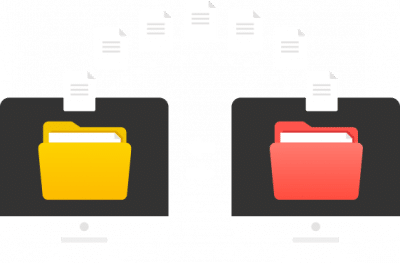
A VPN masks your IP address and protects your identity when downloading torrents. It prevents you from publicly broadcasting your IP address so you will remain anonymous.
8. How can you Bypass Restrictions on the Amazon App Store?
Some of the apps that you would want to download are restricted by the Amazon App Store since they are unverified.
However, you can side-load them into your device without using the official app-distribution method with the help of a VPN.
9. Is a VPN Expensive?
Some VPN service providers offer cheap rates but come with poor service quality, limited simultaneous connections, slow speeds, and some activity logging.
Choose a quality VPN that offers unlimited simultaneous connections on multiple devices, unlimited server switching, anonymous torrenting, zero traffic logs, and unlimited bandwidth for a very affordable price.
Frequently Asked Questions
What is a VPN and why do I need it?
A virtual private network (VPN) is a service that allows you to privately and securely browse the internet. Yes to remain anonymous online you need a VPN on all your devices that access the internet.
What are the Best VPNs?
After testing dozens of the most popular VPN services, the experts at We Find IPTV rank the best VPNs as Surfshark, IPVanish, NordVPN, ExpressVPN, and StrongVPN.
Is a VPN legal?
Yes. A VPN is 100% legal to install and use in most countries including the U.S. However, in some countries VPNs are not legal to use.
How does a VPN work?
A VPN works by routing your device’s internet connection through a private server instead of your internet service provider (ISP). This will mask your IP Address to any websites you visit.
What does VPN stand for?
VPN stands for virtual private network.
What devices can a VPN be installed on?
A VPN is available for installation on almost every electronic device you can think of. This includes PCs, iPhones, Android phones, Amazon Fire TV devices, and many other popular electronic devices.
How much does a VPN cost?
While some VPN services are free, most quality VPN services charge less than $5 per month.
Can you be tracked if you use a VPN?
A VPN encrypts your IP Address from your Internet Service Provider (ISP) making your online activity anonymous.
Should I use a VPN at home?
Yes. If you are accessing the internet at your home we recommend using a VPN for your online privacy.
Should I use a VPN on my phone?
Using a VPN on your phone is not necessary, but recommend if you want to hide your internet activity.
